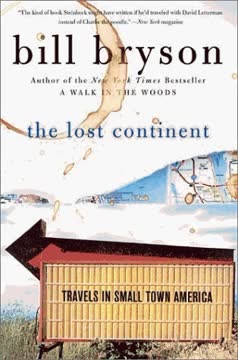Key Takeaways
1. America's unique charm lies in its everyday conveniences and friendly people
"There is a great deal about America that is deeply appealing. There are all the obvious things that outsiders always remark on—the ease and convenience of life, the friendliness of the people, the astoundingly abundant portions, the intoxicating sense of space, the cheerfulness of nearly everyone who serves you, the notion that almost any desire or whim can be simply and instantly gratified."
Convenience is king. America's emphasis on customer service and efficiency is evident in everyday interactions. From drive-through windows to 24-hour stores, the country prioritizes accessibility and ease of use. This commitment to convenience extends to various aspects of life, including:
- Free refills on beverages
- Abundant parking spaces
- Widespread acceptance of credit cards
- Delivery services for almost anything
Friendly faces everywhere. The American penchant for small talk and casual interactions creates a welcoming atmosphere for both residents and visitors. This friendliness manifests in:
- Strangers striking up conversations in public spaces
- Service workers greeting customers with a smile
- Neighbors offering help without hesitation
- A general willingness to assist lost or confused individuals
While some may view these traits as superficial, they contribute to a sense of warmth and hospitality that is uniquely American.
2. The US landscape is vast and diverse, offering both challenges and opportunities
"From my house to Los Angeles is about the same as from London to Lagos."
A country of contrasts. The sheer size of the United States presents both advantages and challenges for its inhabitants. This vastness translates into:
- Diverse climates and ecosystems within a single country
- Long travel times between major cities
- A wide range of lifestyles and cultural experiences
- Challenges in infrastructure and communication across regions
Natural wonders abound. The US boasts an impressive array of natural landscapes, from:
- Towering mountains and vast prairies
- Expansive deserts and lush forests
- Pristine beaches and rugged coastlines
- Unique geological formations like the Grand Canyon
This diversity not only provides recreational opportunities but also contributes to the country's resources and economic potential.
3. American consumerism: A double-edged sword of abundance and waste
"We appear to have created a society in which the principal pastime is grazing through retail establishments looking for things—textures, shapes, flavors—not before encountered."
Abundance everywhere. American stores offer an overwhelming array of choices, reflecting the country's consumer-driven culture. This abundance is evident in:
- Supermarkets with dozens of options for a single product
- Massive shopping malls and outlet centers
- Constant introduction of new products and variations
- Marketing campaigns that create artificial needs
The cost of excess. While this abundance provides convenience and variety, it also leads to:
- Excessive waste and environmental concerns
- Financial strain from overconsumption
- Decision fatigue from too many choices
- A culture of disposability and planned obsolescence
The American consumer culture, while often celebrated, raises questions about sustainability and the true value of endless options.
4. The evolution of comfort in American homes reflects cultural shifts
"If you had to summarize it in a sentence, you could say that the history of private life is a history of getting comfortable slowly."
From necessity to luxury. The concept of comfort in American homes has evolved dramatically over time, reflecting changes in technology, wealth, and social norms. This evolution is evident in:
- The introduction of indoor plumbing and central heating
- The development of ergonomic furniture and appliances
- The rise of open floor plans and multi-functional spaces
- The integration of technology for entertainment and convenience
Changing room functions. The purpose and naming of rooms in American homes have shifted over time, revealing cultural changes:
- The transition from formal parlors to casual living rooms
- The emergence of home offices and media rooms
- The evolution of kitchens from utilitarian spaces to social hubs
- The increasing importance of outdoor living spaces
These changes reflect broader societal shifts towards informality, technology integration, and work-life balance.
5. American bureaucracy: A labyrinth of inefficiency and frustration
"We have become so attached to the idea of convenience that we will put up with almost any inconvenience to achieve it."
Red tape everywhere. American bureaucracy often creates more problems than it solves, leading to frustration for citizens and visitors alike. Common issues include:
- Complicated tax forms and regulations
- Lengthy and confusing legal documents
- Inefficient government agencies and processes
- Overlapping jurisdictions and conflicting rules
The paradox of convenience. In an attempt to make things easier, systems often become more complex:
- Automated phone systems that make it harder to reach a human
- Online forms that require extensive personal information
- "Simplified" processes that involve multiple steps and approvals
- Well-intentioned regulations that create unintended consequences
This bureaucratic maze reflects a tension between the desire for efficiency and the need for accountability, often resulting in systems that satisfy neither goal.
6. The quirks of American English reveal cultural idiosyncrasies
"I recently read an academic study on wordplay in the Smithsonian magazine in which the author asserted that some puckish soul had once sent a letter addressed, with playful ambiguity, to HILL JOHN MASS and it had gotten there after the postal authorities had worked out that it was to be read as 'John Underhill, Andover, Mass.'"
Language evolution. American English has developed its own unique characteristics, reflecting the country's history and cultural values:
- Regional dialects and accents
- Incorporation of words from immigrant languages
- Creation of new words to describe technological advances
- Informal and colloquial expressions in everyday speech
Linguistic creativity. Americans often display a playful approach to language, seen in:
- Clever advertising slogans and brand names
- Inventive nicknames and abbreviations
- Wordplay and puns in popular culture
- The evolution of slang and internet-speak
This linguistic flexibility and creativity mirror the adaptability and innovation that are often associated with American culture.
7. Nostalgia and progress: America's conflicted relationship with its past
"If there is one thing that I trust I have made clear in these pages over the past many months, it is that I am not very good at technical stuff, even at the most basic level."
Yearning for simplicity. Many Americans express nostalgia for a perceived simpler past, even as they embrace technological progress:
- Romanticization of small-town life and "Main Street" America
- Popularity of vintage aesthetics and retro design
- Interest in traditional crafts and "old-fashioned" skills
- Concerns about the pace of technological change
Embracing the future. Simultaneously, Americans are often early adopters of new technologies and ideas:
- Rapid integration of digital tools in everyday life
- Constant upgrades to home appliances and gadgets
- Enthusiasm for futuristic concepts and innovations
- A culture that values novelty and "the next big thing"
This tension between nostalgia and progress reflects a broader cultural ambivalence about change and the direction of society.
8. The American spirit: Resilience, optimism, and the pursuit of happiness
"If you informed an American that a massive asteroid was hurtling toward Earth at 125,000 miles an hour and that in twelve weeks the planet would be blown to smithereens, he would say: 'Really? In that case, I suppose I'd better sign up for that Mediterranean cooking course now.'"
Unshakeable optimism. The American spirit is characterized by a persistent belief in the possibility of improvement and success:
- The "American Dream" of upward mobility
- A can-do attitude in the face of challenges
- Emphasis on self-reliance and personal responsibility
- Celebration of entrepreneurship and innovation
Resilience in adversity. Americans often display remarkable resilience in the face of setbacks:
- Community response to natural disasters
- Economic recoveries after recessions
- National unity in times of crisis
- Individual stories of overcoming obstacles
This combination of optimism and resilience contributes to a national character that, while sometimes criticized as naive, has been a driving force in American progress and innovation.
Last updated:
FAQ
What's I'm a Stranger Here Myself about?
- Personal Journey: The book details Bill Bryson's return to America after living in Britain for twenty years, focusing on his observations of cultural differences.
- Humorous Anecdotes: Bryson shares a series of essays filled with humor, exploring various aspects of American life and society.
- Cultural Commentary: It serves as both a travelogue and a commentary on American culture, touching on themes of nostalgia, identity, and change.
Why should I read I'm a Stranger Here Myself?
- Engaging Writing Style: Bryson's witty and engaging prose makes the book an enjoyable read, blending humor with insightful observations.
- Relatable Experiences: Readers who have lived abroad or returned to their home country will find Bryson's reflections relatable and thought-provoking.
- Cultural Insights: The book offers a unique perspective on American culture, valuable for both Americans and international readers.
What are the key takeaways of I'm a Stranger Here Myself?
- Cultural Disconnection: Bryson illustrates the feeling of being out of place in one's own country after two decades abroad.
- Appreciation for Simplicity: The book emphasizes finding joy in simple pleasures, such as family time and nature.
- Humor in Everyday Life: Bryson finds humor in mundane aspects of life, showcasing how laughter can be found in everyday situations.
What are the best quotes from I'm a Stranger Here Myself and what do they mean?
- "You can go home again.": This quote encapsulates Bryson's journey of rediscovery and acceptance of his home country.
- "I was wrong. You can go home again.": It reinforces the idea that returning home can lead to new perspectives and appreciation for one's roots.
- "It’s a good idea to accept that there are some things that are better and some things that are worse.": This reflects Bryson's acceptance of life's complexities, acknowledging pros and cons.
How does Bill Bryson describe American culture in I'm a Stranger Here Myself?
- Consumerism and Convenience: Bryson highlights the abundance and convenience of American life, noting the ease of daily tasks.
- Cultural Quirks: He points out peculiarities of American customs, such as the obsession with rules and regulations.
- Friendliness of People: Bryson appreciates the warmth and friendliness of Americans, contrasting it with British reserve.
What humorous anecdotes does Bill Bryson share in I'm a Stranger Here Myself?
- The Skunk Encounter: Bryson humorously recounts an encounter with a skunk on his porch, highlighting the absurdity of the situation.
- The Grocery Store Experience: He shares a comical story about navigating American grocery stores, filled with unfamiliar products.
- The Ice Skating Fiasco: Bryson's attempt to ice skate with his children leads to a series of falls and mishaps, showcasing his lack of coordination.
How does Bill Bryson compare life in America to life in Britain in I'm a Stranger Here Myself?
- Cultural Differences: Bryson notes differences in social interactions, such as the informality of addressing people in America.
- Food and Dining: He contrasts dining experiences, highlighting the abundance of fast food in America.
- Attitudes Toward Rules: Bryson observes Americans' strong adherence to rules, often to an absurd degree.
What challenges does Bill Bryson face upon returning to America in I'm a Stranger Here Myself?
- Cultural Reacclimation: Bryson struggles to readjust to American life, feeling out of touch with modern conveniences.
- Navigating Daily Life: He faces challenges in everyday tasks, leading to humorous misunderstandings.
- Family Dynamics: Bryson reflects on changes in family life, particularly with his children growing up.
How does Bill Bryson use humor in I'm a Stranger Here Myself?
- Self-Deprecating Humor: Bryson often pokes fun at himself, making his observations relatable.
- Observational Comedy: He highlights absurdities and quirks of American life, finding humor in the mundane.
- Anecdotal Storytelling: Bryson's anecdotes are filled with humor, leading to unexpected and amusing conclusions.
What does Bill Bryson say about the American education system in I'm a Stranger Here Myself?
- College Costs: Bryson discusses the high costs of college education, expressing shock at the financial burden.
- Cultural Expectations: He reflects on the pressure on students to attend prestigious universities.
- Family Dynamics: Bryson shares his experiences of sending his eldest son to college, capturing the emotional impact.
How does Bill Bryson reflect on the passage of time in I'm a Stranger Here Myself?
- Nostalgia for the Past: Bryson expresses nostalgia for his childhood and the simplicity of life in America.
- Family Growth: He captures the fleeting nature of childhood as he watches his children grow up.
- Cultural Evolution: Bryson observes changes in American society, noting how technology and consumerism have transformed life.
How does Bill Bryson address the theme of nostalgia in I'm a Stranger Here Myself?
- Longing for the Past: Bryson frequently reflects on childhood memories and changes in America.
- Contrast with the Present: He juxtaposes fond memories with modern realities, highlighting the loss of simplicity.
- Cultural Commentary: Bryson uses nostalgia to comment on cultural shifts, questioning gains and losses over time.
Review Summary
"I'm a Stranger Here Myself" is a collection of humorous essays about Bryson's return to America after living in England for 20 years. Readers generally find the book entertaining, with many laughing out loud at Bryson's observations on American culture. Some criticize the dated content and repetitive nature of the essays, while others appreciate the witty commentary on topics ranging from customer service to taxation. The book is best enjoyed in short bursts, mirroring its original format as newspaper columns.
Download PDF
Download EPUB
.epub digital book format is ideal for reading ebooks on phones, tablets, and e-readers.














